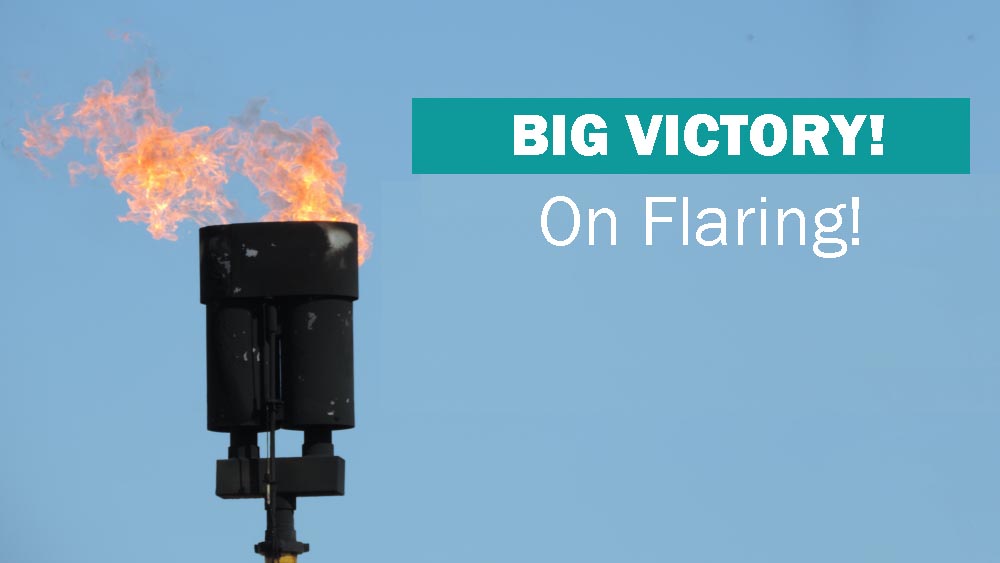- An Alliance For Community Action
- (970) 256-7650
- info@WesternColoradoAlliance.org
State takes steps to cut methane emissions by ending venting and flaring of natural gas
COGCC decision affects oil drillers in Weld and Jackson counties
The state of Colorado reasserted its role as a national leader in the fight against climate change by signaling it plans to end the routine practice of flaring and venting of natural gas at oil wells.
The Colorado Oil & Gas Conservation Commission (COGCC) took a significant step toward meeting the state’s climate goals by agreeing after more than a week of hearings and testimony to proceed with new rules that would bar the practice of disposing of methane into the atmosphere at both new and existing wells across the state. The practice occurs primarily in Weld and Jackson counties, both home to oil drilling operations.
“Imagine a metal chimney two to three times as tall as your house, roaring with flames with the sole purpose of wasting natural gas, which the well operator finds inconvenient to get to market. No tax or royalty is paid on this gas,” said Dr. Barbara Vazquez, a Jackson County resident and member of Western Colorado Alliance’s oil and gas team.
“These flares also spew unburned hydrocarbons, including methane, which is 86 times more potent as a green house gas than CO2, and hazardous air pollutants that impact our health. if you live nearby, you have no idea what you’re breathing,” she continued. “Thanks to the COGCC for adopting the 900 series rules this week that will end routine venting and flaring from oil and gas wells in Colorado.”
“This year’s tragic wildfires confirmed what Coloradans already know: climate change is here,” said Kelly Nordini, executive director of Conservation Colorado. “If we’re going to protect what we love about this state for future generations, we have to take steps to cut pollution—including methane. Thank you to Governor Polis and the COGCC for working to reduce this potent climate pollutant.”
Western Colorado Alliance, Conservation Colorado, and a broad coalition of community and conservation groups applauded the unanimous vote by the COGCC to proceed with developing the new rules.
Colorado’s regulations have long allowed fossil fuel companies to dispose of the methane (natural gas) that comes up with oil either by flaring or in emergencies releasing it directly into the atmosphere. The practice of flaring has been routinely used to decrease pressure in wells, or simply to get rid of the natural gas rather than invest in pipelines or other infrastructure to capture and sell it for use in power plants.
Methane is one of the most potent causes of climate change. When released into the atmosphere, it is 84 times more potent as a heat trapping gas than carbon dioxide. Flaring produces carbon dioxide as well, which is also a major cause of climate change.
According to the World Bank, the United States joins Russia, Iraq, and Iran as the worst countries for flaring and wasting methane. Flaring in the United States rose 23% from 2018 – 2019.
The three largest wildfires in Colorado history have occurred over the last three months.
In addition to climate change, venting and flaring have both economic and public health implications as well.
Every year oil and gas operators in Colorado vent or flare away about 4.6 billion cubic feet of methane, valued at $12 million, according to a study by the Environmental Defense Fund. The practice wastes a viable and common energy source, natural gas, and reduces potential tax revenues that local jurisdictions could use to fund essential services.
Poisonous chemicals like benzene, hydrogen sulfide, and formaldehyde frequently are emitted by the practices as well, all of which have been proven to cause illnesses ranging from neurological disorders to cancer.
Venting and flaring also release volatile organic compounds that combine to create ozone, forcing people to stay indoors and threatening the respiratory health of the elderly and young children. Last April, the American Lung Association issued failing grades to several counties throughout Colorado, including Denver, Boulder, La Plata, and Weld.
Sara Loflin, LOGIC: “We applaud the COGCC and their staff for prohibiting routine flaring and protecting public health in impacted communities and Front Range Air Quality. From Greeley to Erie, to the Western Slope, Coloradans living in the midst of oil and gas facilities should not have to worry about their health and exposure to toxic gases such as benzene and xylene as a result of flaring. The 900 series is an excellent step in addressing the public health risks posed by oil and gas development in the midst of neighborhoods.”
Nathalie Eddy, Colorado and New Mexico Field Advocate, Earthworks: “With this change, COGCC is acknowledging the need to do far more to protect Coloradans from oil and gas pollution. The elimination of routine venting and flaring of oil and gas pollution is key to stemming the threat that industry poses to the climate and public health. Earthworks has learned over years of documenting oil and gas pollution and working with residents to file complaints related to these harmful practices that stricter standards alone will not work without better oversight and enforcement by regulators as well. We thank the Commissioners of COGCC and look forward to continued collaboration to better protect Colorado and its residents.”


